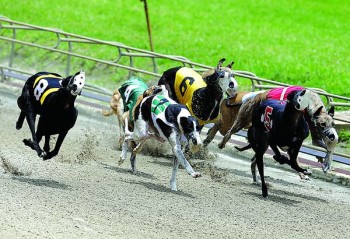
A report commissioned by the West Virginia Legislature recommends the state end subsidies for the greyhound racing industry.
WHEELING, W.Va. — It appears the dogs will continue to run at West Virginia’s two greyhound tracks for at least another year, after Senate Finance Committee Chairman Mike Hall effectively killed legislation that would have ended the sport this summer by pulling it from the committee’s agenda on Monday.
After Hall, R-Putnam, pulled Senate Bill 547 – which would have ended greyhound racing in the state this summer and paid $36.5 million in compensation to West Virginia dog owners and breeders – from the agenda on Saturday, the panel was to consider advancing an alternative bill of its own to the Senate floor on Monday.
But Hall pulled the item from the agenda again after a last-minute conference with Minority Leader Jeff Kessler, D-Marshall, who also sits on the committee.
Barring a suspension of Senate rules, there isn’t enough time to get a bill to the Senate floor in time for “crossover day” Wednesday – the deadline to have legislation read for a third time in its house of origin.
“For all intents and purposes, it’s dead,” Kessler said.
Had the committee advanced its own bill, senators would have had a couple of hours at most to review the final product before voting. Kessler said handling a decision that could affect hundreds of families in that manner would have been wrong.
“I pressed upon (Hall) that I didn’t think it was fair to the senators representing the racetrack counties to have a bill dropped in their lap. … I think it’s something that needs to be fully addressed,” Kessler said.
Hall did not return a call Monday seeking comment about his decision to pull the issue from the agenda.
The debate over the future of greyhound racing in the state heated up in January after New Jersey-based Spectrum Gaming Inc. released a report, commissioned by the Legislature earlier this year, that recommended the state end subsidies for the industry. Those subsidies – a total of $29.3 million during 2013 – come in the form of purse awards and “breeders development funds” generated by a tax on other forms of gambling at West Virginia’s two casinos that operate dog tracks, Wheeling Island Hotel-Casino-Racetrack in Wheeling and Mardi Gras Casino & Resort in Cross Lanes.
The subsidies accounted for 95 percent of all purse awards in 2013, almost two-thirds of which went to out-of-state dog owners. Meanwhile, live wagering at the two tracks has declined 57 percent over the last 10 years.
Kessler believes the Legislature eventually will end the subsidies, but he expressed concern that SB 547, as written, would open the state up to lawsuits that could threaten the existence of the casinos. He pointed out voters approved various expansions of legalized gambling by referendum, under the premise it would be limited to facilities that offer live greyhound or thoroughbred racing.
“A taxpayer could come in and say they broke their promise and the entire casino needs to go, too,” Kessler said.
Although he opposes the buyout concept in general, he didn’t rule out supporting such a proposal in the future if it includes safeguards against litigation.
West Virginia Greyhound Owners and Breeders Association President Sam Burdette, who has pushed lawmakers to enact a buyout plan during this year’s session, could not be reached for comment.
To read more from The Intelligencer/Wheeling News-Register, subscribe here.





